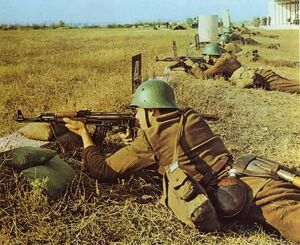| 1989 Bulgarian coup d'état | |||||||
|---|---|---|---|---|---|---|---|
| Part of the Yugoslav Wars and the end of the Cold War | |||||||
 Bulgarian troops fight in the suburbs of Sofia | |||||||
| |||||||
| Belligerents | |||||||
| Commanders and leaders | |||||||
| Petar Mladenov |
Atanas Semerdzhiev Radniu Minchev | ||||||
| Casualties and losses | |||||||
| 50,000 Communist Arrested or executed | 2,000 | ||||||
The 1989 Bulgarian coup d'état was the violent overthrow of the Communist government of the People's Republic of Bulgaria by nationalist military officers. Occurring during the midst of the end of the Cold War, the coup was executed by the Bulgarian People's Army in the summer of 1989. It is alleged by the Communist Party that the rebels were supported by the British military, but these claims are not supported. The coup was a pivotal moment in modern Bulgarian history as the nationalist military government swiftly set in motion numerous wide-ranging modernization reforms in the country, such as the restoration of the monarchy. The military government also implemented economic liberalization, including currency stabilization, removed tariff protections for local industry, banned trade unions and privatized social security and hundreds of state-owned enterprises. Throughout the 1990's and early 2000's, Bulgaria was the best performing government in the Balkans, but critics dispute the legacy of the military government, claiming that it created economic inequality within the nation. Nonetheless, the coup helped spark instability in the Balkans in the final months of the Cold War and Bulgaria's annexation of Macedonia from Yugoslavia is viewed as the beginning of the Yugoslav Wars.
